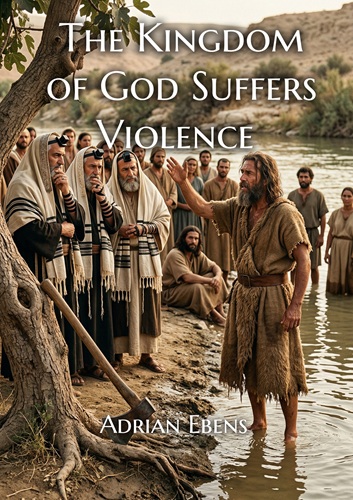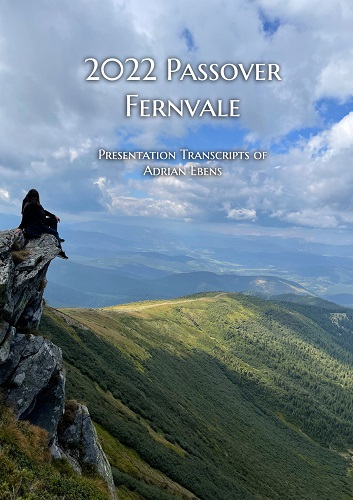Lessons from the Animal Rights Movement on Tactics for Activism
As Adventists, we have a message that is to go out to a dying world: the Three Angels Messages. But how do we do that? How do we gain the attention of the public and shake them to consider things they have never considered before?
"Agitate, agitate, agitate the public mind. There must be no spiritual stupor now. Bring out important points of truth bearing directly upon genuine conversion—tracts of a few pages—and multiply copies for circulation. This will be at some expense if they are given away, but that should not deter or hinder the great work of spreading the truth." (Letter 34, 1875 to Steven Haskell)
We are not the only ones who want to shape public opinion and cause change of belief and behavior. Could we not imagine Animal Rights activists taking these words to agitate - for their cause - to heart? The Animal Rights movement, particularly vegan activists and other environmental rights activists, also want to cause men to see the world differently, come to repentance on an issue, and live in a new manner.
I was reading an article in the magazine American Scholar called ‘The Pain Principle: What if the animal rights movement abandoned its focus on suffering and appealed to a different set of human emotions?’ I found it fascinating because here was a critique of the focus of animal rights agitation – the pain and suffering of animals. In the article, the author says that he was given a copy of Animal Liberation by Australian philosopher Peter Singer at the age of 12 by his non-vegetarian father, and that it was incredibly influential to him, and to the nascent animal rights movement. Its principles have shaped how the movement has moved forward.
In Animal Liberation, Singer argues that racism and sexism and what he calls “speciesism” all rely on arbitrary distinctions. In most Western nations, a person who raises dogs mouth-to-tail in small enclosures would be quickly condemned and would probably face prosecution. And yet, Singer points out, industrial pig farmers do exactly this with equally intelligent, sensitive animals, and they often receive government subsidies for their trouble. Similarly arbitrary distinctions were essential to a slaveholding society, he goes on, and remain so in a society with entrenched systemic racism. It’s important to note that Singer doesn’t assert that slavery and animal captivity are moral equivalents. Instead, he argues that one can help us understand the other. We are biased against certain animals because it is convenient, profitable, or pleasurable for us to exploit them, just as it was convenient, profitable, and pleasurable for plantation owners to exploit the human beings they held in bondage. He contends that in a few short decades, when the next generation (or the next) looks back on our treatment of animals, the practice may well be viewed in much the same way that we now view slavery—as despicable and inexcusable, an expression of extreme cruelty and selfishness.
This line of reasoning – that you wouldn’t cook and eat dogs, you wouldn’t mistreat cats, etc. – is a line that is used frequently today. See, for example, the activism work of @joeycarbstrong. What’s interesting though is that Singer’s predicted idea that factory farming would be seen as despicable as slavery hasn’t happened:
Singer was wrong about at least one thing. No broad shift in our understanding of animal rights has taken place since the publication of Animal Liberation. There have been some small-scale developments. Vegetarianism and veganism are more common and more socially acceptable than ever before. More people are speaking out in support of at-risk “charismatic megafauna”— creatures like elephants and manatees. There is a growing awareness of the beef industry’s contribution to climate change. But in most ways, things are worse than ever for captive animals. Worldwide, we kill about three times more pigs in industrial slaughterhouses than we did in the 1970s. In the United States, animal welfare laws lag behind those of European countries, including Spain. Species everywhere are suffering from habitat destruction.
If Singer’s arguments held any sway in the culture at large, the recent outcries against entrenched racism, sexual harassment, and homophobia might well have led to another outcry—one against the abysmal treatment of industrially raised farm animals. Instead, fast-food chains that profit enormously from the suffering of animals make shows of embracing social justice, filling their TV ads with diverse casts, pledges of support to various causes, and rainbow banners—all in hopes of turning a bigger profit. Organizations such as PETA are disparaged by members of all political stripes. The “radical actions” of animal rights protesters are rarely covered or even acknowledged by the mainstream media. In academia, the arguments and papers of “animal studies” scholars are so extreme and filled with jargon that they seem to be begging for irrelevance.
How did things end up this way? During a time when so many people seem willing to speak out against injustice, why has the cause of animals remained so decidedly on the fringes?
In the article, the author suggests a deep reason why this shift hasn’t occurred: because this line of reasoning isn’t as simple as morally simple and effective as it might seem. The author goes to Spain and watches a bullfight, expecting to be horrified and disgusted by it. Intellectually he still remains “certain that the corrida [bullfighting] is a form of animal torture,” but his reaction to it isn’t “straightforward outrage.” The protestors argued that the bulls felt pain, but that didn’t seem enough to make him, and others, feel like this was Evil, with a capital E, that needed to be stopped immediately:
When Martín [organizer of the annual protest against the bullfight; seen as ineffective by the journalist] spoke to the reporters about a bull’s nervous system and the bovine capacity for both mental suffering and physical pain, she was drawing on the work of my childhood hero, Singer, who puts these neurological functions at the center of his philosophy. Rather than erecting arbitrary lines between those species we feel comfortable exploiting and those we do not, Singer wants us to remember our own vested interest in avoiding sensations of pain, and to extend that consideration to members of other species…
The pain argument has long defined the animal rights movement, and continues to do so. And yet, during the bullfight, witnessing an animal in obvious pain, I felt something much more complicated than revulsion. Why didn’t the corrida inspire straightforward outrage at the suffering on show, even in somebody like myself, who (like many others) is disposed toward sympathy—if not always perfect compassion—for the plight of captive animals? This question, it seems to me, is closely related to the question of why the animal rights movement has not yet lived up to its potential.
The author of the article then brings up what he thinks is the problem – that the empathy we are supposed to have with animals is based on a shared understanding of PAIN, but pain doesn’t actually do that. Pain and suffering can actually cause there to be distance, disconnect, and alienation:
… pain tends to separate—rather than unite—those who experience it from those who don’t…a bystander never actually feels a sufferer’s pain, no matter how earnest the attempt to do so. If you have been in proximity to someone in extreme pain, you know how disconcerting the experience can be—the pain, all-consuming within the sufferer’s body, is nothing within your own. You might begin to feel hopelessly alienated from the sufferer, despite any physical closeness. Scarry says that torture exaggerates this dynamic. Cries for help, she writes, which ought to occasion attention and assistance, can almost serve to discredit the pain.
Is this true? It is definitely something to think about, and I think there is at least some truth to it. I at least see it in myself, especially about suffering I cannot understand. I think of people with insomnia and depression, and how it is easy for me to dismiss it, and when I hear people complain about it there is almost the temptation to think that they are exaggerating it or being over dramatic. Even when someone says they have terrible stomach pain, or when women tell men they have period cramps, we often tend to be tempted to think it is an exaggeration. I remember being shocked when a friend of mine passed out from the pain of her period cramps - that was something I could see and made it real, made the suffering manifest. I then believed her more. This is one of the reasons why Jesus had to manifest His suffering to us in His incarnation, that we would believe Him. When men experience menstrual pain simulation, all of a sudden it became much more real and open to talk about: (See: 'Kerala: Why are Indian men screaming with period pain?' and 'Watch as men experience period pain with a menstrual cramp simulator')
Pain and suffering is scary and unnerving, and thus our carnal nature wants to push it away. Is this not what we do to Jesus, who is suffering on the present cross? How easy it is to forget that God is in pain and that actually He is resting in His power, painless and without any emotion. How tempting it is to forget about all the suffering in the world around us when we are healthy and full. But when we are suffering and in need, how we long for sympathy and compassion!
Our world is a vast lazar house, a scene of misery that we dare not allow even our thoughts to dwell upon. Did we realize it as it is, the burden would be too terrible. Yet God feels it all. (ED 263)
Because sometimes a person's experience can be so different to someone else, this is why there is such a bond between people who have experienced the same type of thing, especially a similar type of difficult experience. There were times on my travels with Pastor Adrian where he would meet another person who had a child with autism. There was an instant connection between them, a shared understanding of each other lives, even across languages and cultures. Paul wants to have this type of closeness with our Saviour:
That I may know Him, and the power of His resurrection, and the fellowship of His sufferings, being made conformable unto His death… (Philippians 3:10)
When Christ’s sufferings are far away, He seems far away; He seems strange to us. Let us ponder this thought as we think of the effectiveness of showing people videos of suffering animals. The author suggests that they also seem far away, and thus we tend to dismiss it as something to be forgotten. The analogy is a deep one, for as Christ’s death is symbolized by food in communion, so do these animals suffer to feed the world.
This line of argument helps explain why undercover videos of animal abuse in feedlots and slaughterhouses—released by organizations such as PETA—haven’t exactly proved to be effective propaganda. The feelings these sights inspire in their audiences are complex. As I walked out of the bullring, the guard at the gate expressed surprise that I was leaving so soon. “It’s not for me,” I told him. But that wasn’t quite true. I wanted my feelings about the fight to be straightforward, and I felt a bit guilty that they weren’t—guilty that part of me had even enjoyed the experience. It would have been easier to forget the whole thing, just as I find it easier not to think too hard about a PETA-produced video of an industrial hog slaughterhouse that I saw years ago.
I think of how Thai people feel when they see these sort of videos. As Buddhists, they should not be eating meat for that means the death of animals, which is a sin according to the 5 Buddhist Precepts. But they are unable to bear the horror of what these videos portray, and instead they either think that these things are only happening in a few places or they get annoyed at the messenger of these videos as they are seen as using almost a form of force to compel them to change. Easier to forget…but not only forget, oftentimes there is serious hardening of the heart that goes on. The author suggests that seeing the pain of these animals actually is to see them in a degraded state, which can be easier for us to dismiss.
Pain not only distances sufferers from those around them, it also distances sufferers from themselves. That is, when people are in extreme pain, they become less like themselves. Our preferences and peculiarities, habits of speech and gesture, even our most deeply held beliefs are likely to be forgotten, or even permanently obliterated, in the face of torture. That’s part of why torture is used by authoritarian regimes (and a few democratic ones, too). It’s not first and foremost a means of collecting information that would otherwise remain inaccessible. More important is its power to break the strength and idealism necessary for resistance.
I think that of how important it is for Africans, for example, to show that they have more to their lives than just their suffering (often done sarcastically). They want to be seen as beings full of agency, hope and joy, able to make videos and write and share just like people in richer countries – they are not just their suffering and their ability to endure. They don’t want to be dismissed as purely a symbol of pity, but as beings who can be lifted up.
When we see and hear stories of brutality in Africa – genocides and murders, extreme violence and theft – it becomes easy for us to blame them for their suffering. We think brutality is in their nature. We forget that this degradation of humanity is caused by the lack of food and water, thus becoming a reinforcing cycle, and that it can happen anywhere. Such is the nature of sin: it dehumanizes, causes more sin, creates an environment of sin, and thus dehumanizes us more – and thus Satan calls for us wicked humans to be destroyed, cause look at us! It is easy to look at the results of sin and think that it is hopeless, and blame the victims.
Those who study the history of the Israelites should also consider the history of the slaves in America, who have suffered, who have been educated in crime, degraded, and oppressed, and left in ignorance to perish. Their physical freedom was obtained at a great loss of life, and Christians generally should have looked with compassion upon the colored race, for which God had a care. They should have done a work for them that would have uplifted them. They should have worked through the wisdom of God to educate and train them. We have been very neglectful of our colored brethren, and are not yet prepared for the coming of our Lord. The cries of these neglected people have come up before God. Who has entered into the work since their deliverance from bondage, to teach them the knowledge of God? The condition of the colored people is no more helpless than was the condition of the Hebrew slaves. The children of Israel were addicted to licentiousness, idolatry, gluttony, and gross vices. This is ever the result of slavery. But the Lord looked upon his people, and after their deliverance, he educated them. They were not left uncared for. Though they had lost in years of bondage the knowledge of the true God and of his holy law, yet God again revealed himself to them. In terrible grandeur and awful majesty he proclaimed to them his holy precepts, and commanded them to obey his law. The ten commandments are a transcript of the divine character, and are as unchangeable as the eternal throne. But since the slaves of the South attained to freedom, what have we as Christians done to bear any comparison to what was done for them by those who poured out their lives on the battle-field? Have we not looked upon the difficulties that presented themselves, and drawn back from the work? Perhaps some of us have felt sad over their wretchedness, but what have we done to save them from the slavery of sin? Who have taken hold of this work intelligently? Who have taken upon them the burden of presenting to them spiritual freedom that has been purchased for them at an infinite price? Have we not left them beaten, bruised, despised, and forsaken by the way? Is this the example that God has given us in the history of the deliverance of the children of Israel?—By no means. RH December 17, 1895, par. 4
We remember that the Israelites were unable to believe God and His promises because of their experience in bondage. “And Moses spake so unto the children of Israel: but they hearkened not unto Moses for anguish of spirit, and for cruel bondage.” (Exodus 6:9) Our world system has winners and losers – half the world’s population lives on less than 6$ a day – and when the poor live degraded lives, we can easily look at them and dehumanize them.
I want to quote this last part in full, because I think it is the most powerful part of this article:
Since animals feel pain, we might consider the probability that they also suffer some version of the process that Scarry describes. For example, wouldn’t the preferences that make a pig a pig (the desire to root or the ability to use more than 20 distinct vocalizations to communicate with members of its species) be degraded by suffering? The bull I saw that afternoon in the arena, ready to charge anything that moved, was not quite representative of its species. Bullfight aficionados talk about the picadors’ lances “focusing” the animal. Before this first pain is inflicted, the bull is often more intent on finding a way to escape the arena than on charging the toreros. As the fight goes on, the increasing damage to the bull’s body seems to resign him to his fate. Thinking back to the first corrida he attended, Hemingway writes that the bull became “an altogether different animal when the banderillas went in, and I resented the loss of the free wild quality he brought with him into the ring.”
The bull behaves as many cornered, injured animals (including human beings) will behave, albeit with significantly more strength and gusto. He attacks his tormentors relentlessly. His apparent willingness to participate in the fight then becomes a means by which the audience justifies his torture. Look, he wants to fight. This process resembles one of the insidious mechanisms of institutions such as slavery. The more certain people are made to suffer, the easier it is to dehumanize them, to view them as stupid, unworthy of serious moral consideration, even deserving of exploitative treatment—as willing participants in their own subjugation.
The very thing that Singer believes will bring the masses over to his side can therefore have the opposite effect. When people read about or watch animals in pain, they witness these beings in a reduced state, a state that does not accurately represent the creatures’ normal habits and abilities. Most people who see a PETA-sponsored video will feel guilt of some kind. But they may also be left with a lingering sense that the animals they have seen aren’t worthy of much more than cursory moral consideration.
None of this is to say that it is impossible (or even all that rare) for humans to meaningfully identify with nonhuman creatures. Rather, it means that we don’t do it readily when we encounter them incapacitated by suffering. In this sense, the animal rights movement took a wrong turn with Theophrastus, the first to articulate the pain theory. Singer writes powerfully of the parallels among racism and sexism and “speciesism.” But—fixated on pain as the basis of his call to action—he fails to remember that the civil rights movement did not gain momentum because white people pitied the suffering of Black people. Rather, the voices of Black artists, musicians, thinkers, and protesters became too powerful to ignore. The same was true of the gay pride and the women’s liberation movements. History suggests that human beings are likelier to treat other humans with dignity when forced to consider their potential, rather than simply their suffering.
The most eaten food in the world, I think, is chicken. According to this logic then, rather than showing merely the suffering of chicken, we should show the unique character of chickens. And I do think some people do this, trying to show the intelligence and humor of pigs and cows and chickens – and that this would help to make them more relatable, as not merely objects of pity, but as animals worthy of being God’s creation, not just our food. (compare this video of pigs suffering vs this pet pig replying to the command of the human to 'sit' along with the pet dogs)
This means getting to know the character of chickens, spending time with them, trying to see what is good in them and share it. Sharing their blood spurting at a factory is, in a sense, easier to do; trying to express that chickens are cute and have personality can be more difficult.
We also note that Singer's line of reasoning, from 1975, is not new. See what Ellen White wrote in Ministry of Healing in 1905. She covers both the suffering critique along with trying to show that animals love, show tenderness and affection, and declares them close in intelligence to humans:
THINK OF THE CRUELTY to animals that meat eating involves, and ITS EFFECT on those WHO INFLICT AND THOSE WHO BEHOLD IT. How it DESTROYS THE TENDERNESS with which WE should regard these creatures of God! MH 315.2
The intelligence displayed by many dumb animals approaches so CLOSELY TO HUMAN INTELLIGENCE that it is a mystery. The animals SEE AND HEAR AND LOVE AND FEAR and SUFFER. They use their organs far more faithfully than many human beings use theirs. They manifest SYMPATHY AND TENDERNESS TOWARD THEIR COMPANIONS IN SUFFERING. Many ANIMALS SHOW AN AFFECTION FOR THOSE WHO have charge of them, far superior to the affection shown by some of the human race. THEY FORM ATTACHMENTS for man which are NOT BROKEN WITHOUT GREAT SUFFERING to them. MH 315.3
What man with a human heart, who has ever cared for domestic animals, could look into their eyes, so full of confidence and affection, and WILLINGLY GIVE THEM OVER TO THE BUTCHER'S KNIFE? How could he devour their flesh as a sweet morsel? MH 316.1
Is there any lesson to take away for us spiritually? We have also been in bondage. Christianity has been degraded, and it is easy to mock and think it can’t be redeemed. I think of my mom watching a Netflix documentary on JMS, a huge student Christian movement in Korea, and its leader Jung Myung-seok who said he was God and raped many women and was sent to ten years in prison. It is embarrassing to see such Christianity, and it would be easy to dismiss the religion as an outsider. (see the trailer here)
What about unorthodox movements in Christianity, particularly the Father-Son movement in Adventism? It is tempting to speak about how we have been victimized – kicked out of churches, being unable to speak, how people slander us, how friends are lost, etc. Because of this, we lash out, often in an unchristian manner (for Jesus says for us to “love our enemy and do good to those who curse us”) and slam the church and those in as frauds, liars, and Jesuits. We can keep hammering the same point, and our hammering can turn into a form of force. This in turn often makes it easier for those in the church to dismiss us – our pain and suffering is dismissed and we are portrayed as drama queens who just want attention and want to feel special and different, or we are unstable and have an irrational need to control other people. This in turn enrages us more, and often makes us become even more like the stereotype they have made of us as one-dimensional, out of touch, obsessives who don’t care about sharing Jesus to non-Adventists.
So what do we do? God has been really gracious in how He has led us. We in the Father of Love movement, if I can call us that, can no longer be portrayed as being one-dimensional and out of touch. From the principles of the Divine Pattern that are the key for helping us know our role and place in the community around us, we have moved to finding a message of hope that is a blessing to the world. No longer are we condemning men to hell because they refuse to follow the laws of a killer God. Instead we are pleading with men to be reconciled with a living, caring God, who we cannot live without – a God that is doing everything to try to show us what we are like so that we might know exactly where we need healing.
There is a time and a place for pointing out the errors of others and showing that Babylon is fallen and that this world is doomed. But we also need to have positive theology. We want to engage with the world and try to show how are principles can relate to them - even if they are not Christian. We can share the principles of headship and submission to a Muslim, who loves the idea of submission to Allah, without hitting them that their religion is wrong. We can expand on the Buddhist Precept to not imbibe intoxicants (narcotics and alcohol), and show the cause and effect of why such rules are important and how such things are spoken of in our Bible. We can share with the atheist our own concerns with how the Bible has been interpreted by political powers to control and debase man, and that we see where he is coming from and we are trying to work on reform within Christianity. In such ways we can gently nudge people towards a more positive idea of our Father in Heaven.
Lastly, I hope that we can inspired to write and present in more new and creative ways. I really liked how this author of this article on Animal Rights talked about his time in Spain experiencing the bullfights, touching deeply on his own personal experience. He mixed his own testimony with intellectual ideas smoothly. I have tried to do some of that too here, talking about my mom watching Netfix and my own experiences with Buddhists. I would encourage those who are wanting to write to also try to do this sort of "creative non-fiction". Straight theology and Ellen White quotes can feel dry; it also at times can feel like it can be written by anybody - the uniqueness of the personality of the writer, their upbringing and culture, is hidden. For us, we have a relational message, we want people to bring spirituality into their life, and thus our experience needs to enter into our sharing of our spirituality.
The articles published in our papers should contain pure provender, thoroughly winnowed from chaff. We are living in a most solemn time. Let our editors call for articles giving living experiences. Let the ministers regard it as a part of their duty to send short articles of experience to our papers. It will be food for those who are laboring in isolated places, in foreign countries and the islands of the sea, to hear in this way from the friends with whom they have been associated. These experiences may be to the readers as a love-feast, because the writers have been eating the bread which came down from heaven. (CW 18)





